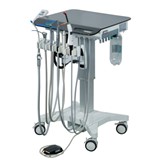Researchers from Monash University detailed the results of a comprehensive study of the experiences of trauma survivors in Victoria in an article published recently in the Medical Journal of Australia.
Led by Associate Professor Belinda Gabbe of the Department of Epidemiology and Preventive Medicine, the research team interviewed, between April 2011 and January 2012, 120 patients who had been treated in Victoria's trauma system between 12 and 24 months previously.
A leading cause of death and long-term disability worldwide, traumatic injury is challenging to treat due to the severity of the damage. Since an organised trauma system was introduced in Victoria in 2000, mortality rates, even for the most critically injured, have fallen.
Although most participants said they received high-quality care while in hospital, communication of treatment options and prognoses was considered poor. Post-discharge care, particularly in outpatient facilities, was criticised by most patients.
Associate Professor Gabbe said the survey was conducted to understand patients’ experiences with the trauma system and identify ways in which care could be improved.
"The study allowed us to review the trauma system through the patients’ experiences," Associate Professor Gabbe said.
"Many expressed that they were lucky to receive such high quality care, supporting the investment in Victoria’s world class trauma system, but clear areas for improvement were identified."
Many patients felt that they received insufficient and often conflicting information about their expected recovery and treatment options. As a result, they felt ill-equipped to make decisions about treatment and frustrated when their recovery did not progress as predicted.
Outpatient clinics were widely criticised with patients experiencing long wait times, inconsistency in the clinicians attending to them and consultations that many felt were too short, or involved inexperienced clinicians.
Many patients suggested solutions for congested outpatient facilities including use of telemedicine for patients in remote areas, and establishing a single point of contact for coordinating out of hospital care.
There are 138 trauma-receiving hospitals in Victoria, of which three are specialised major trauma centres. More than 2700 patients presented with severe traumatic injury in the state in 2010.











-160x160-state_article-rel-cat.png)









